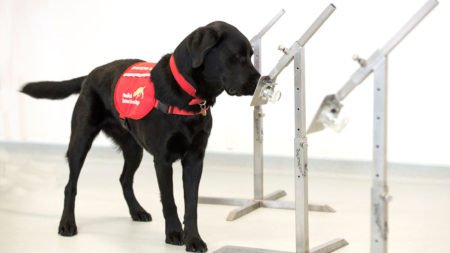Stopping Ebola, be nice or die, a better nose for disease, and more
19 Feb 2021
Posted by Andrew Kantor
Priorities
Who really should be first (well, second) in line to get the Covid-19 vaccine?
Cancer organizations say it should be cancer patients.
“Experts” and mental-health organizations say it should be patients with mental illness.
Schools (in Atlanta and elsewhere) say it should be teachers.
It’s almost as if there’s a pattern there.
Time to track those variants
One of the biggest issues with all these Covid-19 variants popping up is that the U.S. isn’t tracking them. We don’t do enough genetic sequencing to know who’s got what.
That’s about to change, as the CDC says it will make a $200 million “down payment” on a broader program of virus tracking, “the administration’s most significant effort to date to address the looming danger of more contagious variants of the virus.”
Ebola tries to take the field
While we’ve been worried about Covid-19, Ebola has been making a comeback in Africa. The Biden administration says it wants to help quickly “to avoid catastrophic consequences.”
“[E]ven as we battle COVID, we must ensure capacity and financing for health security worldwide.”
Brits will start challenge trials
I wouldn’t think these would be necessary now, what with so many vaccines working, but what do I know? Yep, the British government has given the go-ahead for a human challenge experiment to start within a month.
[It will] as a first step, determine the lowest level of the pandemic coronavirus, SARS-CoV-2, needed to infect the healthy, young volunteers. The researchers then plan to vaccinate additional volunteers and expose them to that “challenge dose” to assess protection and the immune responses that correlate with it.
A better, smarter nose
We’ve known for a while that dogs can smell a Covid-infected person. (Those shifty Danes are using them in airports, in fact.) They can also detect cancer and other illnesses. So an international group of researchers figured, why not build a better dog’s nose?
That part, actually, was easy: “The miniaturized detection system […] is actually 200 times more sensitive than a dog’s nose in terms of being able to detect and identify tiny traces of different molecules.”
What’s tricky is interpreting the molecules. “The dogs don’t know any chemistry,” but they’ve been trained to identify that odor means “alert my handler.” So the engineers turn to artificial intelligence — using a dog to teach a computer to identify diseases.

The goodest of bois
Nice guys die last
Irish researchers have found an interesting correlation: It seems that your personality has a strong relationship with how long you might live.
Thanks to its effect on the immune system, “people who are more conscientious tend to live longer.”
It has been shown that people scoring lower on the personality trait of conscientiousness (a tendency to be responsible, organized, and capable of self-control) can be at a 40% increased risk of future death compared to their higher scoring counterparts.
ICYMI
President Biden will nominate (tap? pick? assign?) former CMS official Chiquita Brooks-LaSure to oversee the agency. One of her initial jobs will be “reversing many of the policies put in place by her predecessor.”
Captain Obvious is at Tim Horton’s today
“Canadian Study Confirms COVID-19 More Serious Than Influenza”
The Long Read — and reminder to keep up with the state regs
Elberton Medical Center in Elbert County began vaccinating teachers, unaware that the state had changed its guidelines. Result: The state seized its vaccine supply and stopped shipments until July.


